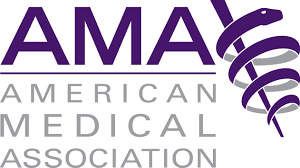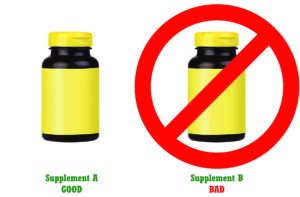Although we initially said this was going to be a five-part series, well, things change. We had more information than we originally planned on – specifically for the next segment (Part IV) which addresses nutrition and supplements, and the importance that they play in your ongoing road to wellness. Part IV will now have three sub-segments: Part IV-a – which makes the case for supplements in general; Part IV-b – which talks about what supplements NOT to take; and Part IV-c – which addresses what supplements TO take. Part V will then address re-evaluation and hear from some of our satisfied patients.
(The Right) Food is Better Than Supplements
OK –  this one might seem obvious… but not so fast. (The Right) at the beginning of the heading is important. Food is better than supplements – but not just any food. Fruits, vegetables, healthy proteins, etc. – GOOD. Double-cheeseburger and onion rings – BAD. But even eating what most people would probably consider a “healthy” diet, it is not always possible.
this one might seem obvious… but not so fast. (The Right) at the beginning of the heading is important. Food is better than supplements – but not just any food. Fruits, vegetables, healthy proteins, etc. – GOOD. Double-cheeseburger and onion rings – BAD. But even eating what most people would probably consider a “healthy” diet, it is not always possible.
So you eat a lot of fruits and vegetables. But are you eating only organic fruits and vegetables? Over-farming and improper (or non-existent) crop rotation has resulted in many of the corporate farms growing produce in virtually nutrient-barren soil. So bring in the herbicides, pesticides, genetically-modified seeds, and soil additives, right? These may allow the fruits and vegetables to still grow nice and pretty and big – but they still have no nutrient value!
A landmark study on the topic by Donald Davis and his team of researchers from the University
of Texas (UT) at Austin’s Department of Chemistry and Biochemistry was published in December 2004 in the Journal of the American College of Nutrition. They studied U.S. Department of Agriculture nutritional data from both 1950 and 1999 for 43 different vegetables and fruits, finding “reliable declines” in the amount of protein, calcium, phosphorus, iron, riboflavin (vitamin B2) and vitamin C over the past half century. Davis and his colleagues chalk up this declining nutritional content to the preponderance of agricultural practices designed to improve traits (size, growth rate, pest resistance) other than nutrition. (Source: Scheer, Roddy and Moss, Doug, EarthTalk®: Dirt Poor: Have Fruits and Vegetables Become Less Nutritious? In Scientific American. Retrieved from www.ScientificAmerican.com)
The Organic Consumers Association cites several other studies with similar findings: A Kushi Institute analysis of nutrient data from 1975 to 1997 found that average calcium levels in 12 fresh vegetables dropped 27 percent; iron levels 37 percent; vitamin A levels 21 percent, and vitamin C levels 30 percent. A similar study of British nutrient data from 1930 to 1980, published in the British Food Journal, found that in 20 vegetables the average calcium content had declined 19 percent; iron 22 percent; and potassium 14 percent. Yet another study concluded that one would have to eat eight oranges today to derive the same amount of Vitamin A as our grandparents would have gotten from one. (Source: Scheer, Roddy and Moss, Doug, EarthTalk®: Dirt Poor: Have Fruits and Vegetables Become Less Nutritious? In Scientific American. Retrieved from www.ScientificAmerican.com)
Do you eat meat?
If not, you are likely deficient in Vitamin B12, zinc and Vitamins A and D – which are found only in animal products. Vegetarians can fare better if they are willing to eat full-fat dairy and cheese; not so for vegans. Is the meat you eat grass-fed and grass-finished? (While most cattle spend the majority of their lives in pastures eating grass before moving to a feedlot for grain-finishing, grass-finished beef cattle remain on a pasture and forage diet.) If not, you are likely deficient in Omega-3s, and at increased risk of irritation and inflammation that goes along with being exposed to the hormones and antibiotics that are used on livestock to replace the nutrients and benefits that naturally occur in good-old grass. And if the livestock is corn-fed, you are likely at increased risk of exposure to genetically-modified goodies, since 88% of the corn grown in the United States is genetically modified. (Source: Kelly, Margie (2012, October 30, Updated 2012, December 30) Top 7 Genetically Modified Crops, In The Huffington Post – The Blog. Retrieved from www.huffingtonpost.com)
One huge problem with genetically-modified corn is that it contains a pesticide that cannot be washed off. Most genetically-modified food grown in the U.S. is “Roundup Ready,” meaning it can withstand spraying of Monsanto’s Roundup pesticide and live, while weeds around it die. (Well, that’s how it works initially; now resistant “superweeds“ have increased the amount of pesticides farmers must spray on their GE crops.) (Source: Kelly, Margie (2012, October 30, Updated 2012, December 30) Top 7 Genetically Modified Crops, In The Huffington Post – The Blog. Retrieved from www.huffingtonpost.com)
Do you eat only pastured eggs?
Chickens naturally want to peck at the grass and eat bugs. That’s what they were “made” to do. When corporate factory-farms raise hatching chickens in enclosed coops (in addition to the ethical treatment concerns) they eat manufactured feed, which likely will leave you deficient in Vitamins A & D and Omega-3s. Factory-farm eggs are also likely to come from hormone- and antibiotic-treated chickens, which then raises concerns associated with those treatments. (Source: Dr. Marlene Merritt, DOM, Lac, ACN, (2012, November 6) How to Read a Vitamin Label, Retrieved from www.youtube.com)
Do you avoid sugar at all costs?
Sugar flushes minerals out of the human body, especially magnesium and chromium – so if you do consume sugar (any amount), you are likely mineral-deficient. Sugar also requires an excessive amount of B-Vitamins to metabolize – so if you consume sugar you’re likely deficient in B-Vitamins as well. (Source: Dr. Marlene Merritt, DOM, Lac, ACN, (2012, November 6) How to Read a Vitamin Label, Retrieved from www.youtube.com)
Do you avoid sodas at all costs?
Soft drinks also flush minerals from the body. (Source: Dr. Marlene Merritt, DOM, Lac, ACN, (2012, November 6) How to Read a Vitamin Label, Retrieved from www.youtube.com)
If you are drinking “regular” sodas, you have the additional exposure to massive amounts of sugar and its inherent problems (see previous paragraph), or worse yet – high-fructose corn syrup (HFCS). HFCS goes straight to the liver and triggers a process called lipogenesis (the production of fats like cholesterol and triglycerides), which is why it is the primary cause of “fatty liver” – a condition that can cause liver failure and affects 70 million people. The rapid absorption of the sugars in HFCS causes huge spikes in blood sugar, to which your body responds by flooding your body with insulin. Both of these processes have been linked to higher rates of diabetes in Americans. High levels of free fructose have also been proven to quite literally punch holes in your intestinal lining (a malady often called “Leaky Gut”), allowing nasty byproducts of toxic gut bacteria and partially-digested food proteins to enter your bloodstream and trigger the inflammation we know to be the root cause of obesity, diabetes, heart disease, cancer, dementia and accelerated aging. It is important to note that the fructose which occurs naturally in fruit does not exhibit the same biological effects as the free high fructose found in HFCS. HFCS contains contaminants including mercury that are not regulated or measured by the FDA. (Source: Dr. Mark Hyman, 5 Reasons High Fructose Corn Syrup Will Kill You, Retrieved from www.drhyman.com)
Do you eat fats like organic butter (from grass-fed & grass-finished cows) and coconut oil? You probably saw the butter in the montage of healthy foods at the beginning of this section, and thought it was a misprint. Not so.
If you are on a low-fat diet, you really are not doing yourself any favors. You are likely deficient in Vitamins A, D, K2 and E. Putting butter on your vegetables actually aids in the metabolizing of the minerals naturally found in the vegetables. (Source: Dr. Marlene Merritt, DOM, Lac, ACN, (2012, November 6) How to Read a Vitamin Label, Retrieved from www.youtube.com)
Still think you eat a healthy diet?
The AMA Chimes In
Even th e American Medical Association (AMA) is on board. The following quotes appeared in Vitamins for Chronic Disease Prevention in Adults by Robert Fletcher, MD, MSc and Kathleen M Fairfield, MD, PhD in the Journal of the American Medical Association (JAMA) 2002;287(23) 3/27-3/29:
e American Medical Association (AMA) is on board. The following quotes appeared in Vitamins for Chronic Disease Prevention in Adults by Robert Fletcher, MD, MSc and Kathleen M Fairfield, MD, PhD in the Journal of the American Medical Association (JAMA) 2002;287(23) 3/27-3/29:
“It appears prudent for all adults to take vitamin supplements”
“Insufficient vitamin intake is apparently a cause of chronic diseases” and
“A large proportion of the general population is apparently at risk.”
Not All Supplements Are Created Equal
When eve n the AMA says, “It appears prudent for all adults to take vitamin supplements,” it seems pretty clear. We need supplements. But not all supplements are created equal. This is where your practitioner from Nature’s Balance Acupuncture and Wellness Center comes in. Your practitioner will steer you to not only the “good” supplements (there are a lot of bad ones out there), but the supplements that are right for you and for the condition(s) you are looking to treat.
n the AMA says, “It appears prudent for all adults to take vitamin supplements,” it seems pretty clear. We need supplements. But not all supplements are created equal. This is where your practitioner from Nature’s Balance Acupuncture and Wellness Center comes in. Your practitioner will steer you to not only the “good” supplements (there are a lot of bad ones out there), but the supplements that are right for you and for the condition(s) you are looking to treat.
So how do you tell the good from the bad? Well, that will be the topics of “I Think I’m Sick – Now What? Part IV-b: You Are What You Eat – What Supplements NOT to Take”, and “I Think I’m Sick – Now What? Part IV-c: You Are What You Eat – What Supplements TO Take”.
Conclusion
Interested in how we might be able to help you achieve optimal health? Visit our Facebook page for more tips and client testimonials, or give us a call at 815.788.8383!
